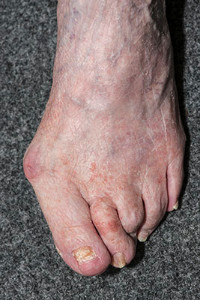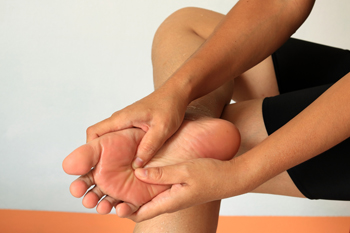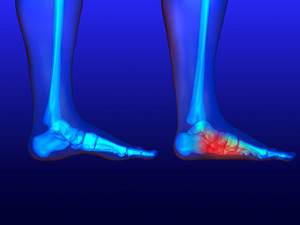
 Many people enjoy the ease of wearing flip flops. They have become a popular shoe to wear in the warmer months, and are available in bright colors. As attractive as they may seem to frequently wear, research has indicated there may be injuries that can happen to the feet due to their use. The feet may become tired and achy as a result of the toes grasping the shoe so it can remain on the foot. Many flip flops are designed without having a built in arch, which may cause the feet to roll inward. It can be beneficial to choose flip flops that have a strap in the back, in addition to wearing more supportive shoes every other day. If you would like additional information about how flip flops may affect the feet, please consult with a podiatrist.
Many people enjoy the ease of wearing flip flops. They have become a popular shoe to wear in the warmer months, and are available in bright colors. As attractive as they may seem to frequently wear, research has indicated there may be injuries that can happen to the feet due to their use. The feet may become tired and achy as a result of the toes grasping the shoe so it can remain on the foot. Many flip flops are designed without having a built in arch, which may cause the feet to roll inward. It can be beneficial to choose flip flops that have a strap in the back, in addition to wearing more supportive shoes every other day. If you would like additional information about how flip flops may affect the feet, please consult with a podiatrist.
Flip-flops are not always the best choice of footwear. If you have any concerns about your feet or ankles, contact one of our podiatrists from Grand Blanc Family Footcare. Our doctors will assist you with all of your foot and ankle needs.
Flip-Flops and Feet
When the weather starts warming up, people enjoy wearing flip-flops. Flip-flops are comfortable, stylish, and easy to slip on and off; they're perfect for any summer beach goer. However, these shoes can cause harm to the feet.
How Can Flip-Flops Affect Me Long-Term?
Are There Injuries Associated with Flip-Flops?
Yes. Since flip-flops are relatively weak and do not provide the same amount of support as sneakers, people who wear flip-flops regularly are more susceptible to injuries. On top of that, the open nature of the shoe makes your feet more prone to other problems, such as cuts and even infections. Common injuries and ailments include:
I like Wearing Flip-Flops. Are There Safe Alternatives?
When buying flip-flops, try to find ones that have sturdy soles and that are made of high-quality materials that will support for your feet. These flip-flops will cost more but will also last longer as a result.
If you have any questions please feel free to contact our office located in Grand Blanc, MI . We offer the newest diagnostic and treatment technologies for all your foot and ankle needs.
 A bunion is considered to be a bone disorder that can gradually get worse. It appears as a bony protrusion on the side of the big toe, and larger shoes may need to be worn that can accommodate the growing bunion. It generally develops as a result of genetic factors, or from wearing shoes that do not have adequate room for the toes to move freely in. Additionally, existing medical conditions including flat feet and specific types of arthritis, may contribute to the development of a bunion. In severe cases, calluses may form on top of the bunion, and friction may cause this to happen. Some of the symptoms that are associated with this condition may include a numbing or burning sensation, and it may be difficult to move the affected toe. If you have signs of a bunion, it is suggested that you consult with a podiatrist who can guide you toward the correct treatment options.
A bunion is considered to be a bone disorder that can gradually get worse. It appears as a bony protrusion on the side of the big toe, and larger shoes may need to be worn that can accommodate the growing bunion. It generally develops as a result of genetic factors, or from wearing shoes that do not have adequate room for the toes to move freely in. Additionally, existing medical conditions including flat feet and specific types of arthritis, may contribute to the development of a bunion. In severe cases, calluses may form on top of the bunion, and friction may cause this to happen. Some of the symptoms that are associated with this condition may include a numbing or burning sensation, and it may be difficult to move the affected toe. If you have signs of a bunion, it is suggested that you consult with a podiatrist who can guide you toward the correct treatment options.
If you are suffering from bunions, contact one of our podiatrists of Grand Blanc Family Footcare. Our doctors can provide the care you need to keep you pain-free and on your feet.
What Is a Bunion?
A bunion is formed of swollen tissue or an enlargement of boney growth, usually located at the base joint of the toe that connects to the foot. The swelling occurs due to the bones in the big toe shifting inward, which impacts the other toes of the foot. This causes the area around the base of the big toe to become inflamed and painful.
Why Do Bunions Form?
Genetics – Susceptibility to bunions are often hereditary
Stress on the feet – Poorly fitted and uncomfortable footwear that places stress on feet, such as heels, can worsen existing bunions
How Are Bunions Diagnosed?
Doctors often perform two tests – blood tests and x-rays – when trying to diagnose bunions, especially in the early stages of development. Blood tests help determine if the foot pain is being caused by something else, such as arthritis, while x-rays provide a clear picture of your bone structure to your doctor.
How Are Bunions Treated?
If you have any questions, please feel free to contact our office located in Grand Blanc, MI . We offer the newest diagnostic and treatment technologies for all your foot care needs.
Research has indicated that more than half of pregnant women experience uncomfortable foot conditions as it gets closer to delivering their child. A common ailment that is experienced can include flat feet, or collapsed arches, which can be a result of the additional weight the feet endure. Heel pain may come from plantar fasciitis which can happen when the tissue that runs along the bottom of the foot becomes inflamed. Hormonal changes may cause the condition that is known as cracked heels to develop, and relief may be found when a good moisturizer is frequently applied. If you would like additional information about how pregnancy can affect the feet, it is suggested that you consult with a podiatrist.
Pregnant women with swollen feet can be treated with a variety of different methods that are readily available. For more information about other cures for swollen feet during pregnancy, consult with one of our podiatrists from Grand Blanc Family Footcare. Our doctors will attend to all of your foot and ankle needs.
What Foot Problems Can Arise During Pregnancy?
One problem that can occur is overpronation, which occurs when the arch of the foot flattens and tends to roll inward. This can cause pain and discomfort in your heels while you’re walking or even just standing up, trying to support your baby.
Another problem is edema, or swelling in the extremities. This often affects the feet during pregnancy but tends to occur in the later stages.
How Can I Keep My Feet Healthy During Pregnancy?
If you have any questions please feel free to contact our office located in Grand Blanc, MI . We offer the newest diagnostic and treatment technologies for all your foot and ankle needs.
 Pain that is felt in the ball of the foot is most commonly associated with a condition known as Morton’s neuroma. Morton’s neuroma typically develops when a nerve becomes inflamed behind the third and fourth toes. Common symptoms of this condition may include pain, swelling, numbness, tingling or burning, and feeling like you’re walking on a rolled-up sock. To help alleviate discomfort, it’s recommended to rest the feet as often as possible, ice the affected area, and elevate and compress the feet as well. Custom orthotics, along with the use of anti-inflammatory medications, have also been found helpful in reducing pain. However, for more severe cases, surgery may be the best option. This is known as Morton's neurectomy. According to a recent study at Nottingham University Hospital in England, 82% of people who underwent the operation reported good to excellent results. For a proper diagnosis and to determine your best treatment options, it is highly recommended that you consult with a podiatrist.
Pain that is felt in the ball of the foot is most commonly associated with a condition known as Morton’s neuroma. Morton’s neuroma typically develops when a nerve becomes inflamed behind the third and fourth toes. Common symptoms of this condition may include pain, swelling, numbness, tingling or burning, and feeling like you’re walking on a rolled-up sock. To help alleviate discomfort, it’s recommended to rest the feet as often as possible, ice the affected area, and elevate and compress the feet as well. Custom orthotics, along with the use of anti-inflammatory medications, have also been found helpful in reducing pain. However, for more severe cases, surgery may be the best option. This is known as Morton's neurectomy. According to a recent study at Nottingham University Hospital in England, 82% of people who underwent the operation reported good to excellent results. For a proper diagnosis and to determine your best treatment options, it is highly recommended that you consult with a podiatrist.
Morton’s neuroma is a very uncomfortable condition to live with. If you think you have Morton’s neuroma, contact one of our podiatrists of Grand Blanc Family Footcare. Our doctors will attend to all of your foot care needs and answer any of your related questions.
Morton’s Neuroma
Morton's neuroma is a painful foot condition that commonly affects the areas between the second and third or third and fourth toe, although other areas of the foot are also susceptible. Morton’s neuroma is caused by an inflamed nerve in the foot that is being squeezed and aggravated by surrounding bones.
What Increases the Chances of Having Morton’s Neuroma?
Morton’s neuroma is a very treatable condition. Orthotics and shoe inserts can often be used to alleviate the pain on the forefront of the feet. In more severe cases, corticosteroids can also be prescribed. In order to figure out the best treatment for your neuroma, it’s recommended to seek the care of a podiatrist who can diagnose your condition and provide different treatment options.
If you have any questions, please feel free to contact our office located in Grand Blanc, MI . We offer the newest diagnostic and treatment technologies for all your foot care needs.
 The medical term that is referred to as flat feet occurs when there is no visible arch, or a significantly small arch, as the foot lies flat on the floor. Genetic factors may be a cause of this condition, as well as wearing shoes that do not fit correctly. This ailment may cause a general feeling of achiness in the feet, and it is possible that strained muscles in the calves can develop. Mild relief may be found when gentle stretching techniques are performed that are specifically designed to strengthen the arch area of the foot. Additionally, many patients find it beneficial to wear orthotics inside of their shoes, as this may provide the support that is needed to complete daily activities. If you have flat feet, it is suggested that you confer with a podiatrist who can help you to manage this condition.
The medical term that is referred to as flat feet occurs when there is no visible arch, or a significantly small arch, as the foot lies flat on the floor. Genetic factors may be a cause of this condition, as well as wearing shoes that do not fit correctly. This ailment may cause a general feeling of achiness in the feet, and it is possible that strained muscles in the calves can develop. Mild relief may be found when gentle stretching techniques are performed that are specifically designed to strengthen the arch area of the foot. Additionally, many patients find it beneficial to wear orthotics inside of their shoes, as this may provide the support that is needed to complete daily activities. If you have flat feet, it is suggested that you confer with a podiatrist who can help you to manage this condition.
Flatfoot is a condition many people suffer from. If you have flat feet, contact one of our podiatrists from Grand Blanc Family Footcare. Our doctors will treat your foot and ankle needs.
What Are Flat Feet?
Flatfoot is a condition in which the arch of the foot is depressed and the sole of the foot is almost completely in contact with the ground. About 20-30% of the population generally has flat feet because their arches never formed during growth.
Conditions & Problems:
Having flat feet makes it difficult to run or walk because of the stress placed on the ankles.
Alignment – The general alignment of your legs can be disrupted, because the ankles move inward which can cause major discomfort.
Knees – If you have complications with your knees, flat feet can be a contributor to arthritis in that area.
Symptoms
Treatment
If you are experiencing pain and stress on the foot you may weaken the posterior tibial tendon, which runs around the inside of the ankle.
If you have any questions please feel free to contact our office located in Grand Blanc, MI . We offer the newest diagnostic and treatment technologies for all your foot and ankle needs.